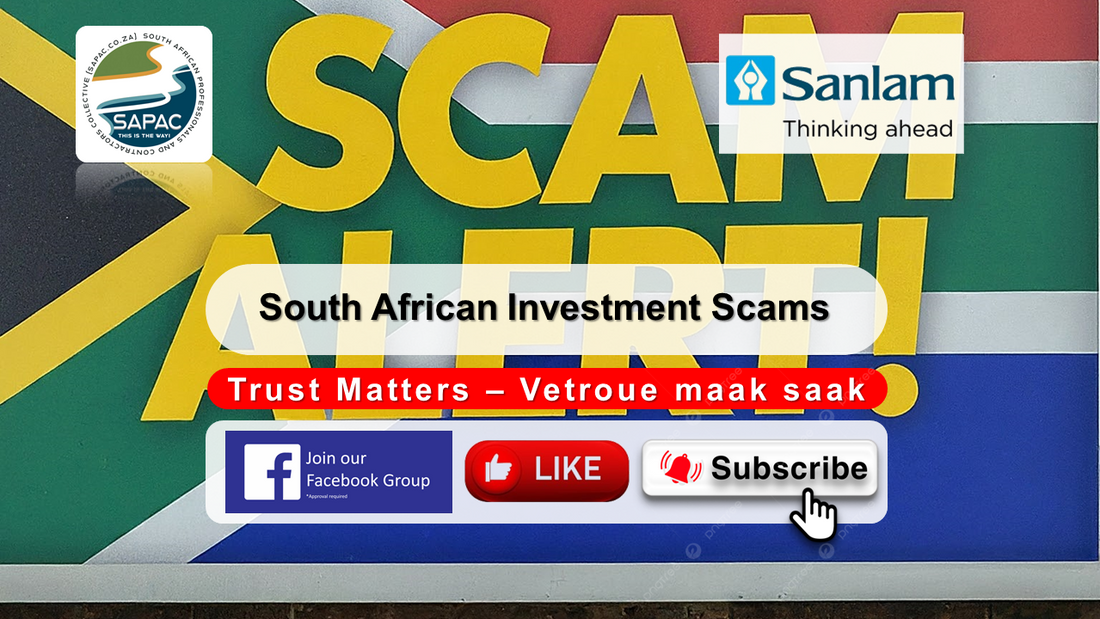
South African Investment Scams
SAPAC ReporterShare
South African Investment Scams
Prepared by : Independent
Article Classification: Types of Scams
Image courtesy: SAPAC Professionals and Contractors
Get in contact with SAPAC:![]() Besoek | Visit https://sapac.co.za/
Besoek | Visit https://sapac.co.za/
📑 Complete Form: Link (PRESS HERE) FOR SAPAC
[GOEIE INFORMASIE] SLUIT AAN! https://bit.ly/JoinSAPAC
Areas: Southern Africa, Northern Cape, Western Cape, Cape Winelands, Free State, Gauteng, North West Province, Limpopo, Mpumalanga, Natal
South African Investment Scams
South Africans lose more money to investment scams than any other type. These scams can be hard to spot. However some are in the open.
Don't lose your life savings to a money-making opportunity that's too good to be true.
Scammers use convincing marketing and new technology to make their investment sound too good to miss. They promise you big payouts with little or no risk. They often use pressure tactics to get you to act fast, so they can steal your money.
Warning signs it might be a scam
- Fake news stories or ads that claim a celebrity recommends this scheme to make big money.
- Computer generated Artificial Voice overs is also used sounding like celebrities or official news reports
- An online contact (a friend or romantic interest) that you've never met in person starts talking to you about investing.
- Emails, websites, Social media groups, WhatsApp groups or ads with testimonials and over-the-top promises of big returns.
- High pressure tactics designed to rush you to act so you don't 'miss out'.
- The 'adviser' who is helping you claims they don't need an South African FAIS License to operate
- You are asked to promote the scheme to friends and family to earn commission.
Steps you can take to protect yourself
Always stop, think, and check before you act. These scams will often pressure you to act quickly. Don't let them rush you into a bad decision.
Get independent legal advice, or financial advice from a financial advisor registered with FAIS. Do your due diligence to make sure you know who you're dealing with. Make sure the company, website, or social media group is not named on the International Organization of Securities Commission's (IOSCO) investor alerts
Other things you should check:
- that the person you are dealing with works for the organization they say they do, using contact details you found yourself.
- the person trying to sell you a financial or investment product, or who is giving you financial advice, has an approved FAIS License and number the address and contact details for the company are correct on public listed directories.
- the company's share listing is indeed on the stock exchange. If the offer to buy the shares is well below the market value shown – it’s a scam. If you are told the shares are being released pre - initial public offering (IPO), be even more cautious.
- when the domain name was registered A new website for an existing company is a warning sign.
Common investment scams
- Crypto Scams
- Fake celebrity endorsements scams
- Online dating scams
- Ponzi Schemes
- Imposter bond scams
- Fake initial public offering scams
- Superannuation scams
- Gambling and sports betting scams
- Betting syndicates
- Sports investments
- Cannabis Investments (Medical Marijuana)
More information
Visit the SABRIC website for more information on investment scams.
Think you've been scammed?
1. Act fast to stop any further losses
Contact your bank or card provider immediately to report the scam. Ask them to stop any transactions.
Change passwords on all your devices and online accounts like email, banking, government sites and shopping sites.
2. Report the Scam
Once you have had the opportunity to have secured your details, you should open up a SAPS Case number, you can help us to try and stop the scammers or to warn other by reporting the scam to us. Depending on the nature of the scam site with a case number it can be listed.
3. Get help to recover
With your case number visit your nearest Department of Home Affairs and provide them with the information of your case including your signed affidavit. They should be able to capture the fact that your personal details may have been stolen and may be used for criminal activities. Visit their Website and make an appointment https://www.dha.gov.za/
South Africa Current Time (SAPAC Time) - 24 Hour Format
South African Professionals and Contractors (SAPAC) Time

